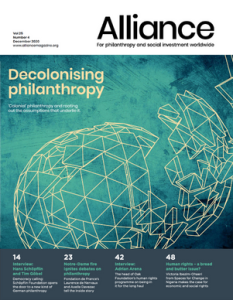When Alliance magazine published its issue on decolonising philanthropy in early September 2022 – we had no idea it would arrive just days before the passing of Queen Elizabeth II bringing debates about monarchies and colonisation to the fore all throughout the world.
It prompted us to ask how philanthropy should engage with monarchical power, given that monarchies are sometimes associated with colonial rule. What, if anything, should be required of philanthropy especially those with a commitment to social justice?
Alliance colleagues across the field share their views on these questions.
Philanthropy should back republican movements…

Keiran Goddard
Speaking personally, it strikes me that philanthropy could be bolder in its support of republican movements. If you are a funder concerned with decolonisation, racial justice, economic inequality, democratic participation, or self-determination, then those are all issues that are deeply and inexorably tied up with empire and its continued legacies. The role of the monarchy isn’t purely symbolic, and to pretend it is requires one to actively ignore material reality; in terms of wealth accumulation, cultural artefacts and heritage as well as its outright and ongoing influence on legislative and regulatory policy. None of which is to say funders should be doing X or Y, funding A rather than B, but rather, it is simply to suggest that if an organisation’s charitable mission overlaps with any of these vital issues, then it is probably worth considering the organisation’s attitude and position on monarchy, and crucially, what assumptions, ideologies and conventions might be driving and shaping it.
Keiran Goddard, Alex Ferry Foundation (United Kingdom)
…have no truck with divine power

Naila Farouky
Being of Palestinian, Jordanian, Egyptian, and Turkish ancestry, it’s safe to say the effects of colonialism and imperialism are well-embedded in my DNA.
I grew up listening to stories from my Egyptian/Turkish grandparents who often spoke with nostalgia about the days of King Farouk. As members of the aristocracy, their trauma in post-imperialist, post-monarchist Egypt had, no doubt, coloured their longing for the days that harkened back to “order, civilized decorum,” and whatever else we think “imperialism” gave us.
On the other hand, my Palestinian/Jordanian grandparents, who were decidedly not of the aristocracy, would tell their own stories of the tragedy of Britain’s role in shaping the historic trajectory of Palestine and allowing for the birth of the State of Israel, an outcome that was less than ideal. In both versions, the impact of monarchy looms large in the tapestry of my collective family history.
Philanthropy could back movements to defund monarchies or simply refuse to help monarchies legitimise themselves through avoiding participation in their philanthropic schemes.
My own fascination and admiration for the pomp and ceremony surrounding royalty has undergone a gradual shift over the years, culminating in what I can politely call a radicalized disdain for the institution in more recent years. I find it impossible to reconcile the values and ethos of the decolonization movement with any respect or institutional upholding of any monarchy – regardless of its origin. It feels ridiculous to expect people to accept the fallacy that royals are somehow, inexplicably, bestowed divinity and that we are somehow beholden to revere them blindly. When we examine, even superficially, the consequences that have befallen many marginalized populations at the hands of monarchist leaders, it feels insane to accept the continuation of the institution, no matter its intentions or goodwill. Here, I don’t distinguish between royalty in the Global North or South, it’s all outdated and social justice philanthropy should help dismantle it as swiftly as possible.
Philanthropy could back movements to defund monarchies or simply refuse to help monarchies legitimise themselves through avoiding participation in their philanthropic schemes, however well-intentioned they may be.
When discussing monarchy with me many years ago, my frustrated father lamented: “Imagine being so delusional to expect another human being to bow down to you in reverence! How utterly pathetic.” And that, in a nutshell, adequately describes my take on the institution.
Naila Farouky, Arab Foundations Forum (Egypt and the US)
Changing symbols is not enough

Chandrika Sahai
Yes monarchies should be ended but symbolism isn’t enough – a colonial mentality of extraction, exploitation, and inequalities live on in so many ways in the former colonies even those like mine that are Republics and where our own feudal systems have been disbanded. We need to do more.
Chandrika Sahai, Philanthropy for Social Justice and Peace (India)
The real issue is how to shift the power

Shonali Banerjee
At its core, power in philanthropy should rest less with those already in power – be they wealthy people, monarchs or oligarchs – and more with those doing work on the ground. In this sense, philanthropists should absolutely engage more deeply, meaningfully, and financially in democracy-building efforts, social movements, and civil rights advocacy in their respective countries – something funders have often been reluctant to do.
Philanthropy cannot be properly decolonised if philanthropists only focus on reactionary or symptomatic support for systemic issues– they need to be involved in the deeper project of building more inclusive, healthy societies. In countries with monarchies, this might mean making difficult decisions to support programmes that tackle social and economic inequality rather than maintaining entrenched systems of power. There is a fine line philanthropists must walk, particularly those based in countries with monarchies, between doing good and not ruffling powerful feathers. But philanthropists themselves wield enormous power, so ideally, they should be finding ways to work towards system change that is reflective of broader citizens and not just the top.
The agenda for philanthropy must motivate philanthropists to put their fingers on the pulse of those on the ground to ensure they are supporting sustainable societal progress – which in many cases involves shaking up outdated colonial existing power structures!
Dr Shonali Banerjee, Centre for Strategic Philanthropy, Cambridge Judge Business School and guest editor of our decolonising philanthropy special feature (United Kingdom)
Monarchy and colonisation are not synonymous

Halima Mahomed
Monarchies are often associated with colonisation, but in reality, are not always so. I think of the monarchies in Africa that predate colonization. Whether all monarchies are elitist and even perpetuate inequality as a basis for needing to be challenged – even while being revered by many – is though, a very important discussion. I see how the decolonization debate can be reflected in terms of European monarchies, which hold significant complicity, but it would also need to acknowledge the contextual variance.
Halima Mahomed, Trust Africa (South Africa)

Andrew Milner
The contention that monarchy is the ultimate symbol of colonialism seems to me very difficult to sustain. Plenty of countries have had monarchs without having colonial enterprises. If most of the European powers who created colonies in the nineteenth century were monarchies, it was only because monarchy was the prevailing form of authority at the time. Conversely, many nations, have had colonies without having monarchies. The Greek city states of antiquity and the medieval Italian states were generally oligarchies. More recently, the Americans and the French (sometimes) have been ostentatiously republican but have not hesitated to have colonies. If you want to construe colonialism more widely as hierarchy, which we hint at in our latest special feature on decolonising philanthropy, then there’s a good case for saying that monarchs – where there are monarchs – are its symbol.
For a better contender to symbolise colonialism in its more generally understood sense, I might offer the merchant ship (it’s often said that trade follows the flag, but it’s been more often the case that the flag has followed trade) or even the maxim gun, ‘the weapon most associated with imperial conquest’ in the words of historian Martin Gilbert.
Andrew Milner, Alliance magazine (United Kingdom)
New issue: Decolonising philanthropy
 The word ‘decolonisation’ was coined to describe the withdrawal of colonial powers from territories they had occupied. What forms have decolonisation practices taken among foundations? Should philanthropy be making reparations? And what significance does decolonisation have for philanthropic institutions when they are geographically distant from the former colonies? These are among the questions to be explored in the latest issue of Alliance. Guest edited by Shonali Banerjee, Centre for Strategic Philanthropy, Cambridge University and Urvi Shriram, Indian School of Development Management.
The word ‘decolonisation’ was coined to describe the withdrawal of colonial powers from territories they had occupied. What forms have decolonisation practices taken among foundations? Should philanthropy be making reparations? And what significance does decolonisation have for philanthropic institutions when they are geographically distant from the former colonies? These are among the questions to be explored in the latest issue of Alliance. Guest edited by Shonali Banerjee, Centre for Strategic Philanthropy, Cambridge University and Urvi Shriram, Indian School of Development Management.
Subscribe today to read it!






Comments (0)